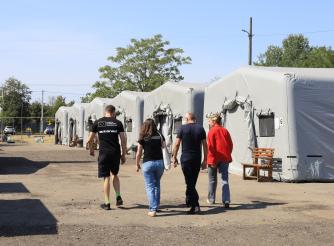One year after Myanmar military’s seizure of power, aid agencies call for increased effort to end human suffering

Statement from humanitarian agencies working in Myanmar: ActionAid, CARE International, Danish Refugee Council, International Rescue Committee, Norwegian Refugee Council, Oxfam, Save the Children and Trócaire
The recent upsurge in military airstrikes and indiscriminate attacks against civilians in Myanmar highlight the failure of efforts to protect civilians from harm and find a durable solution to the root cause of the conflict.
As we mark one year since Myanmar’s military seized power, we reiterate calls for Myanmar's military and all parties to the conflict to protect civilians from harm.
Around 1,500 people including at least 100 children have been killed since 1 February 2021, and more than 11,000 arrested.
In the past year, more than 400,000 people have fled their homes due to fighting, joining an estimated 340,000 people who were already displaced.
Recent airstrikes and other large-scale military attacks in Kayah state — including the 24 December massacre near the village of Moso — have caused an estimated 120,000 people to flee their homes.
Violence has also escalated in the western states of Chin, Magwe and Sagaing, with more than 130,000 people fleeing their homes since May 2021.
Displaced people urgently need shelter, food, water, medical care and other essential aid, including services for survivors of conflict-based sexual violence and other forms of violence against women. Myanmar’s military and other actors must allow local and international humanitarian actors immediate, unrestricted, and sustained access to areas where people are in need.
Local civil society groups, community-based organisations and volunteers face considerable risks to their safety. We reiterate that humanitarian workers should never be a target.
The response from international governments and multilateral bodies has so far been insufficient. We call on the international community to take the following actions:
UN Security Council to pass a resolution to facilitate the protection of civilians, a cessation of hostilities and increased humanitarian access, and set out the measures they will take to hold perpetrators of grave violations to account.
ASEAN to expedite dialogue and formulate a clear action plan to deliver on its Five-Point Consensus. The consensus included as its first and second items the immediate cessation of violence in Myanmar and dialogue to seek a peaceful solution.
Donors to increase funding to meet the scale of humanitarian need in Myanmar. 14.4 million people are in need of humanitarian assistance, up from 3 million in 2021. Donors must specifically allocate funds to humanitarian programs that meet the specific needs and vulnerabilities of marginalised groups, including women and girls, who make up more than half of those requiring humanitarian assistance. More funding, including flexible and adaptive funding, should be made available to local humanitarian groups in Myanmar, with strategic investment in local and national civil society organisations, especially women’s organisations.


